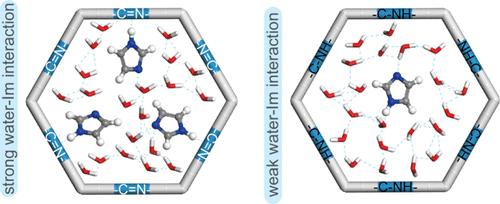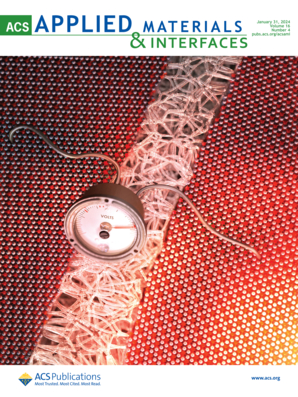Tuning the Crowding Effect of Water and Imidazole in Covalent Organic Frameworks for Proton Conduction
IF 8.3
2区 材料科学
Q1 MATERIALS SCIENCE, MULTIDISCIPLINARY
引用次数: 0
Abstract
The proton conduction of imidazole under confined conditions has attracted widespread attention from researchers. Under anhydrous conditions, the proton transfer behavior is primarily governed by the molecular dynamics of imidazole. However, within a water-mediated system, the crowding effect of water and imidazole in a confined space may outweigh the intrinsic properties of imidazole itself. In this study, we have meticulously adjusted the structural fragments within the covalent organic frameworks (COFs), fine-tuning the saturation level of imidazole loading and adjusting the crowding degree of imidazole and water molecules. As a result, the two COF composites exhibit distinctly different proton conduction mechanisms from 32 to 100% relative humidity (RH), of which one possesses proton conduction progressively shifting from the Grotthuss mechanism to the vehicle mechanism, while the other has proton conduction undergoing a transition from the vehicle mechanism at 32% RH through the Grotthuss mechanism at 75% RH and finally back to the vehicle mechanism at 100% RH. These results highlight the critical role of the crowding effect of water and imidazole within confined spaces in proton conduction.

求助全文
约1分钟内获得全文
求助全文
来源期刊

ACS Applied Materials & Interfaces
工程技术-材料科学:综合
CiteScore
16.00
自引率
6.30%
发文量
4978
审稿时长
1.8 months
期刊介绍:
ACS Applied Materials & Interfaces is a leading interdisciplinary journal that brings together chemists, engineers, physicists, and biologists to explore the development and utilization of newly-discovered materials and interfacial processes for specific applications. Our journal has experienced remarkable growth since its establishment in 2009, both in terms of the number of articles published and the impact of the research showcased. We are proud to foster a truly global community, with the majority of published articles originating from outside the United States, reflecting the rapid growth of applied research worldwide.
 求助内容:
求助内容: 应助结果提醒方式:
应助结果提醒方式:


